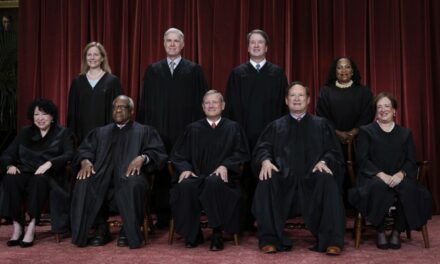We support our Publishers and Content Creators. You can view this story on their website by CLICKING HERE.

Back in November, Columbia University announced it was forming a task force on anti-Semitism. Earlier this week, Haaretz, a left-leaning Israeli paper, published a story based on interviews with the leaders of the task force. Their final report hasn’t been published yet but the story gives a clear sense of their findings based on hundreds of testimonies from students at the school.
Advertisement
One professor encountering a Jewish-sounding surname while reading names before an exam asked the student to explain their views on the Israeli government’s actions in Gaza. Another told their class to avoid reading mainstream media, declaring that “it is owned by Jews.” A third revealed a student’s complaint about an offensive comment regarding Jews by publicly displaying their email to fellow students…
These are just a few of the hundreds of testimonies the Columbia Task Force on Antisemitism has documented that detail harassment, intimidation, discrimination and exclusion against Jewish students by professors and fellow students at the New York university since the October 7 Hamas massacre and subsequent war in Gaza.
The general sense task force members got from talking to students was that anti-Semitism was a big problem on campus.
“We heard from students who feel their identity, values and very existence on campus have been under attack,” adds Fuchs, who has been a public affairs and political science professor at Columbia for 40 years. “My heart was broken listening to these students and what they were being forced to deal with.”
Another co-chair, Prof. David M. Schizer, from Columbia Law School, notes: “Only when we talked to the students did we realize how serious the problem is. Unfortunately, there are still many faculty members who do not believe that there is antisemitism on campus…”…
“Based on conversations with students, we now know that some faculty members are unfortunately also creating a hostile environment toward Israelis in classrooms and are encouraging rule-breaking by student protesters,” [Prof. Gil] Zussman says. “For example, over 10 faculty and staff were standing outside Hamilton Hall when students broke in [on April 29 as part of the pro-Palestinian protest]. If I were a parent of one of these students, I would have major concerns about these faculty.”
Advertisement
It’s also not clear what recommendations the task force will be making to the school but task force members said it would include a new mandatory orientation on anti-Semitism.
Critics of the task force have used the definition of anti-Semitism as a means to attack to their efforts. Task force members say that have adopted an educational definition which says criticism of Israel’s government is fine but calls for the death or destruction of Israel and/or Zionists would be considered anti-Semitic.
The new definition is meant to be used for educational purposes but it not a legal definition. Nevertheless, the Intercept has already published a story criticizing the task force and the definition:
“This definition is designed to inform faculty and students about what can offend Jewish people and which types of statements can cause pain and discomfort,” Haaretz reported. “An educational definition will not infringe upon freedom of speech on campus or prohibit potentially antisemitic phrases.”
Given that aggressive police raids at Columbia and Barnard, its women’s college, that saw student protesters arrested and the shutdown of the entire campus, the claim that free speech on campus will not be repressed beggars belief. Even if the only use of the definition is during mandatory orientations on antisemitism, its deployment inscribes the dangerous antisemitism/anti-Zionism conflation into campus culture.
Advertisement
The police raids at Columbia were not based on a definition of anti-Semitism, they were based on the fact that some pro-Palestinian students had decided to violate established rules about the time, place and manner of protests. By pitching tents in public areas, occupying those tents overnight and, later, by taking over a campus building those students were arrested for their actions violating those rules, not for their speech. Any other group which had occupied public spaces and refused to leave would have received the same treatment. The author of the Intercept piece knows this but isn’t interested in any nuance that doesn’t help her case.
The final report should be out in a few more weeks. Meanwhile, it appears the Dept. of Education is backing up the claims of widespread anti-Semitism on campus. Monday the Dept. sent letters to two schools (CUNY and U. Mich.) but investigations of several other schools, including Columbia, are ongoing. I don’t have any inside information but my guess is Columbia will be found to be one of the worst offenders.

 Conservative
Conservative  Search
Search Trending
Trending Current News
Current News 







